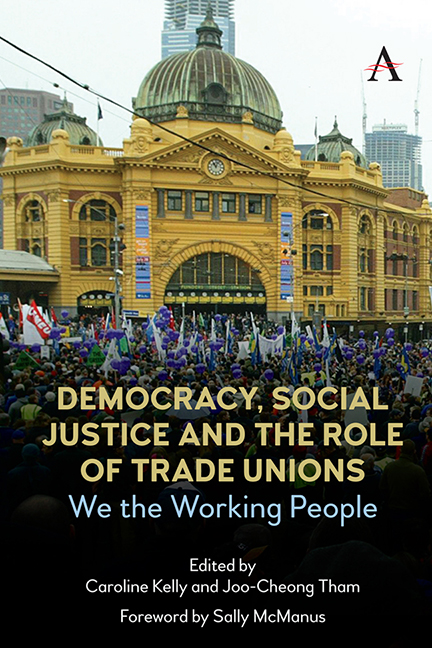Book contents
- Frontmatter
- Contents
- Foreword
- Acknowledgements
- Chapter 1 Democracy and Social Justice as Organising Principles
- Chapter 2 Economic Democracy, Workers and Unions
- Chapter 3 Nobody Owns the Future
- Chapter 4 Regulatory Approaches to the Internal Affairs of Trade Unions in Australia: From Democratic Control to Corporate Accountability
- Chapter 5 Trade Unions and the Regulation of Election Funding: Between Libertarianism and Egalitarianism
- Chapter 6 Trade Unions and Precarious Work: In Search of Effective Strategies
- Chapter 7 ‘Is There an App for That?’ Worker Representation, Unions and the Gig Economy
- Chapter 8 Temporary Migrant Workers and Trade Unions in Australia: A Complex Relationship
- Chapter 9 Unions, Fossil Fuel Exports and a Just Transition
- Chapter 10 Trade Agreements, Labour Rights and Democracy
- Chapter 11 Trade Unions, Labour Law and Democratic Socialism: The COVID-19 Crisis in the United Kingdom
- Notes on Contributors
- Index
Chapter 11 - Trade Unions, Labour Law and Democratic Socialism: The COVID-19 Crisis in the United Kingdom
Published online by Cambridge University Press: 18 November 2021
- Frontmatter
- Contents
- Foreword
- Acknowledgements
- Chapter 1 Democracy and Social Justice as Organising Principles
- Chapter 2 Economic Democracy, Workers and Unions
- Chapter 3 Nobody Owns the Future
- Chapter 4 Regulatory Approaches to the Internal Affairs of Trade Unions in Australia: From Democratic Control to Corporate Accountability
- Chapter 5 Trade Unions and the Regulation of Election Funding: Between Libertarianism and Egalitarianism
- Chapter 6 Trade Unions and Precarious Work: In Search of Effective Strategies
- Chapter 7 ‘Is There an App for That?’ Worker Representation, Unions and the Gig Economy
- Chapter 8 Temporary Migrant Workers and Trade Unions in Australia: A Complex Relationship
- Chapter 9 Unions, Fossil Fuel Exports and a Just Transition
- Chapter 10 Trade Agreements, Labour Rights and Democracy
- Chapter 11 Trade Unions, Labour Law and Democratic Socialism: The COVID-19 Crisis in the United Kingdom
- Notes on Contributors
- Index
Summary
The United Kingdom is a country where the Queen reigns but chaos governs. Chaos caused initially in recent years by the decisions of the Treasury to impose a 10-year programme of austerity with disproportionate burdens on the British population; followed by the distraction and self-immolation of Brexit on the back of a populist referendum in 2016; followed in turn by the domestic impact of the COVID-19 pandemic, which represents one of the greatest public administration failures in modern British history. It will be for consideration at some stage whether these failures were due in part to the programme of austerity and the distraction of Brexit by which they were preceded. Preliminary evidence suggests, however, that there was a state of neglect and unpreparedness before the crisis, as well as a lack of capacity to respond appropriately during it.
The United Kingdom has been a testing ground for neoliberalism and austerity, and their implications for workers’ rights. The real test of any model, however, is how well it copes in a crisis. This would be true of labour law, as of any other area of law or any other institutional arrangements beyond the law. But in determining how well a system of labour law operates in a crisis, it is necessary to have a sense of the discipline's purpose, which is itself contentious. Every type of economy has a system of labour law, though the objectives are clearly very different. The neoliberal vision of labour law will be very different from a social democratic vision – the former emphasising the virtues of flexible employment models and free labour markets, and the latter emphasising high labour standards, job security and different forms of worker involvement in decision making.
The COVID-19 crisis has revealed the abject failure of the neoliberal vision. Correction. The COVID-19 crisis has revealed the spectacular success of the neoliberal vision through the lens of its authors. It has enabled employers to shed labour quickly and to cut pay with a minimum of formality and expense. But with the shifting of responsibility in employment exclusively to the worker, COVID-19 also has serious implications for workers’ communities, on a scale which is completely unsustainable even in the short term.
- Type
- Chapter
- Information
- Democracy, Social Justice and the Role of Trade UnionsWe the Working People, pp. 191 - 214Publisher: Anthem PressPrint publication year: 2021

